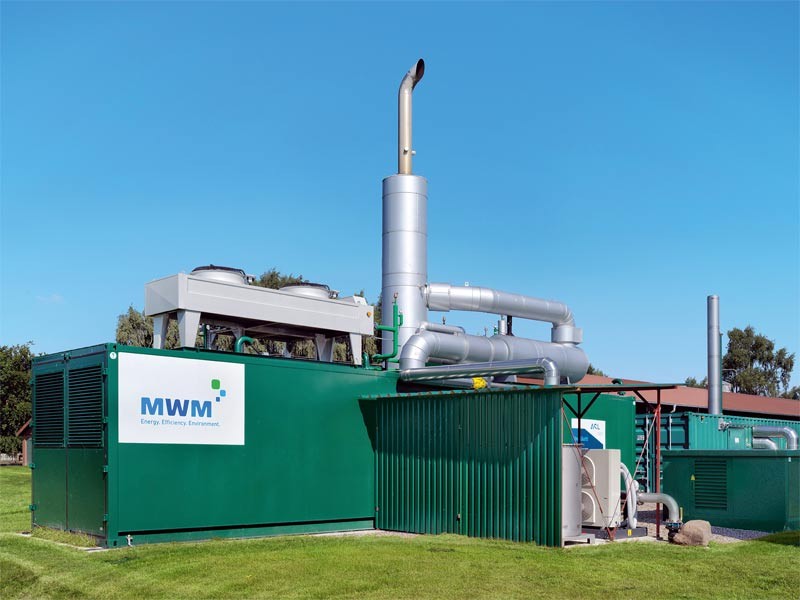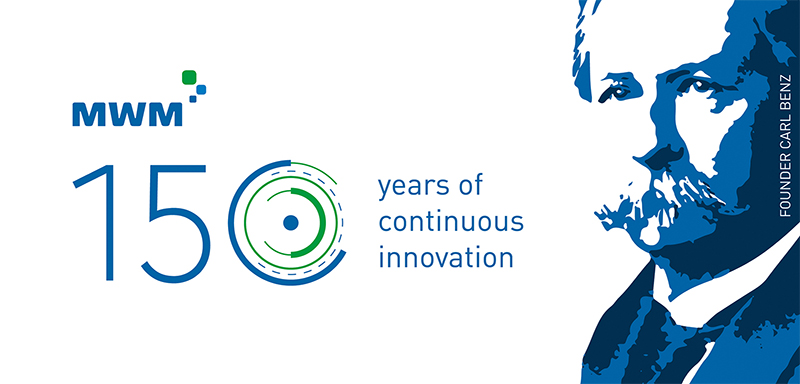Climate-Friendly Power and Heat Energy with MWM Gas Engines: Biogas Plants Continue to Be Key Factor in Carbon Reduction
Mannheim, August 28, 2018
Biogas is a fully climate-neutral alternative to natural gas. Unlike fossil fuels, it is gained by digesting readily available biomass in biogas plants. In the future, the use of organic waste and wastewater, agricultural and forestry byproducts, and biogenic production leftovers for the generation of energy will become increasingly important. Moreover, the nutrient management of biogas is also gaining in significance. Biogas plants with cogeneration power plants represent an efficient and economic solution for generating climate-friendly power and heat energy. Along with the disposal of biogenic raw material, they also represent a key factor for reducing greenhouse emissions, as shown by the statistics of the German Biogas Association.

Farmer and energy supplier: For the operation of the CHP plant of Bioenergie Hack Verwaltungsgesellschaft mbH, half of the biogas is produced from cattle manure from the farm’s own dairy cows and from corn from the farm’s own fields.
According to the survey conducted by the German Biogas Association, Germany’s gross biogas plant output in 2018 amounts to approximately 33 billion kWh, enough to supply about 9.5 million households. The heat used outside the plants amounts to more than 12 billion kWh, a figure that corresponds to the heating demand of more than 1 million households. Additionally, the use of biogas plants is expected to reduce carbon emissions by a total of 20 t in 2018, as the use of biogas does not release any CO2 that had been trapped for millions of years and would increase the CO2 level in the atmosphere. The combustion of biogas merely releases the CO2 that had already been in the air just a few months ago. The carbon cycle is thus shorter and more predictable.
Making Full Use of the Potential of Biogas Plants
This year, the biogas plant output relevant to the actual power production is expected to increase by a mere 25 MW to 3,789 MW. However, the increase in flexible output could amount to 268 MW in 2018.
Flexible operation of biogas-fueled cogeneration power plants continues to be an attractive option from the perspective of the energy reform. In combination with the high-quality use of heat by means of heat networks, biogas plants contribute to climate protection at two levels: the replacement of fossil energy sources both on the power side and on the heat side.
However, the potential for even more climate protection through biogas has not yet been fully exploited. One of the reasons for this is that some of the goals are not yet economically feasible. Biogas will only be able to make full use of its strengths in the energy reform and in climate protection if the political framework conditions, such as amendments to the German Renewable Energies Act (EEG), are more closely aligned with the industry’s economic circumstances.
The German Biogas Association calls for reforms at eye level for plants that digest liquid manure and that are not covered by the tender procedure under the German Renewable Energies Act (EEG), as many potential plants that could digest liquid manure are not yet feasible from the economic perspective. However, the Climate Protection Plan 2050 of Germany’s federal government provides for increased use of liquid manure digestion. “If we want to promote the development of biogas in agriculture and settlements, the political framework conditions need to be more closely aligned with the economic circumstances in the industry. In this way, biogas will be able to fully demonstrate its strengths with respect to the energy reform as well as climate and environmental protection”, says Dr. Claudius da Costa Gomez, CEO of the German Biogas Association.
Digital Power Plant Control TPEM (Total Plant & Energy Management)
Caterpillar Energy Solutions offers biogas-optimized gas engines, complete plants, and containers for combined heat and power (CHP) generation. These systems achieve maximum efficiency in various output bands. MWM also provides the system components required for gas processing and treatment for MWM gas engines. Where generators are installed in remote areas, the generated energy can even be used exclusively by the plant. With its comprehensive digital power plant control system TPEM, MWM has redefined the control standard for distributed energy solutions. In many application scenarios, TPEM eliminates the need for an additional control system, as all power plant data for the genset and plant control are combined in one system. The optimum power plant control enables high economic efficiency through central bundling and control.
Further information:
Contact Media
Aljoscha Kertesz
Manager Communications
T +49 621 48 18 35 76
E mwm-press@cat.com
Frank Fuhrmann
Online Editor
Member of DPV / German Press Association
T +49 621 48 18 35 16
E mwm-press@cat.com









































